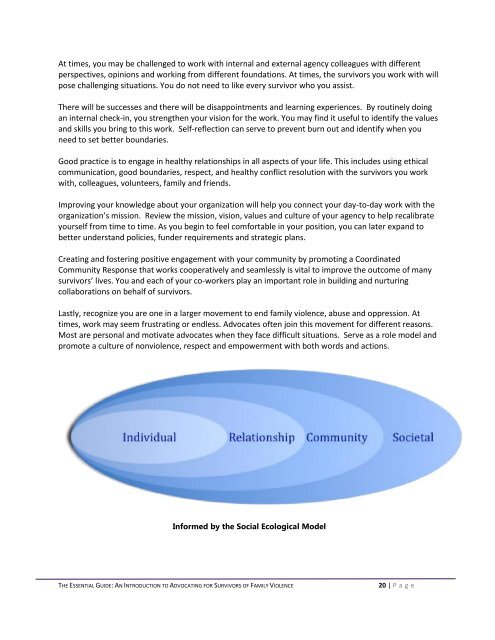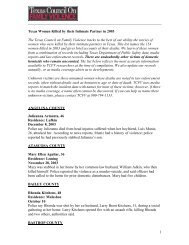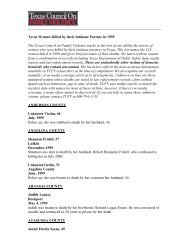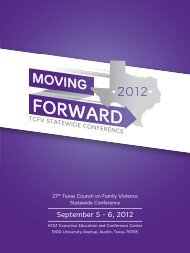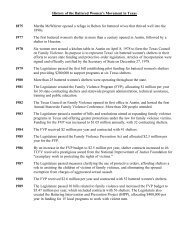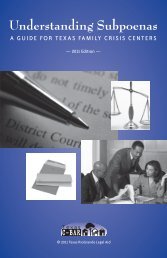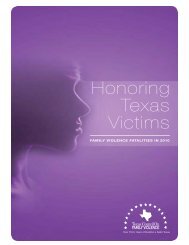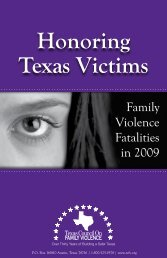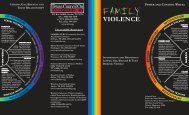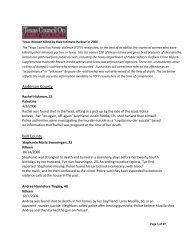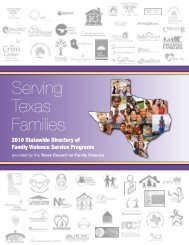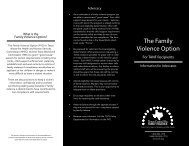the essential guide - Texas Council on Family Violence
the essential guide - Texas Council on Family Violence
the essential guide - Texas Council on Family Violence
You also want an ePaper? Increase the reach of your titles
YUMPU automatically turns print PDFs into web optimized ePapers that Google loves.
At times, you may be challenged to work with internal and external agency colleagues with differentperspectives, opini<strong>on</strong>s and working from different foundati<strong>on</strong>s. At times, <str<strong>on</strong>g>the</str<strong>on</strong>g> survivors you work with willpose challenging situati<strong>on</strong>s. You do not need to like every survivor who you assist.There will be successes and <str<strong>on</strong>g>the</str<strong>on</strong>g>re will be disappointments and learning experiences. By routinely doingan internal check-in, you streng<str<strong>on</strong>g>the</str<strong>on</strong>g>n your visi<strong>on</strong> for <str<strong>on</strong>g>the</str<strong>on</strong>g> work. You may find it useful to identify <str<strong>on</strong>g>the</str<strong>on</strong>g> valuesand skills you bring to this work. Self-reflecti<strong>on</strong> can serve to prevent burn out and identify when youneed to set better boundaries.Good practice is to engage in healthy relati<strong>on</strong>ships in all aspects of your life. This includes using ethicalcommunicati<strong>on</strong>, good boundaries, respect, and healthy c<strong>on</strong>flict resoluti<strong>on</strong> with <str<strong>on</strong>g>the</str<strong>on</strong>g> survivors you workwith, colleagues, volunteers, family and friends.Improving your knowledge about your organizati<strong>on</strong> will help you c<strong>on</strong>nect your day-to-day work with <str<strong>on</strong>g>the</str<strong>on</strong>g>organizati<strong>on</strong>’s missi<strong>on</strong>. Review <str<strong>on</strong>g>the</str<strong>on</strong>g> missi<strong>on</strong>, visi<strong>on</strong>, values and culture of your agency to help recalibrateyourself from time to time. As you begin to feel comfortable in your positi<strong>on</strong>, you can later expand tobetter understand policies, funder requirements and strategic plans.Creating and fostering positive engagement with your community by promoting a CoordinatedCommunity Resp<strong>on</strong>se that works cooperatively and seamlessly is vital to improve <str<strong>on</strong>g>the</str<strong>on</strong>g> outcome of manysurvivors’ lives. You and each of your co-workers play an important role in building and nurturingcollaborati<strong>on</strong>s <strong>on</strong> behalf of survivors.Lastly, recognize you are <strong>on</strong>e in a larger movement to end family violence, abuse and oppressi<strong>on</strong>. Attimes, work may seem frustrating or endless. Advocates often join this movement for different reas<strong>on</strong>s.Most are pers<strong>on</strong>al and motivate advocates when <str<strong>on</strong>g>the</str<strong>on</strong>g>y face difficult situati<strong>on</strong>s. Serve as a role model andpromote a culture of n<strong>on</strong>violence, respect and empowerment with both words and acti<strong>on</strong>s.Informed by <str<strong>on</strong>g>the</str<strong>on</strong>g> Social Ecological ModelTHE ESSENTIAL GUIDE: AN INTRODUCTION TO ADVOCATING FOR SURVIVORS OF FAMILY VIOLENCE20 | P a g e


